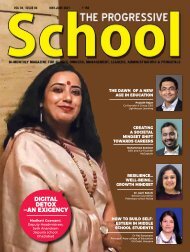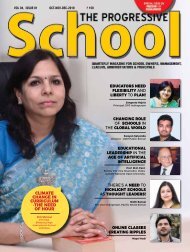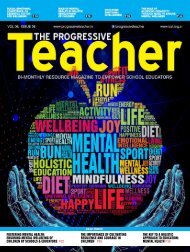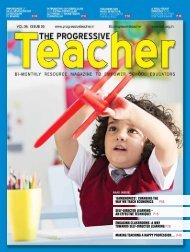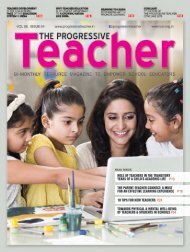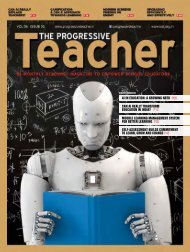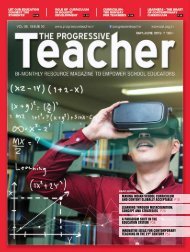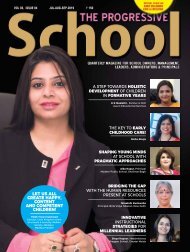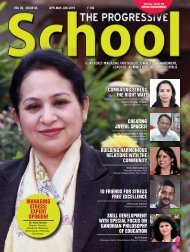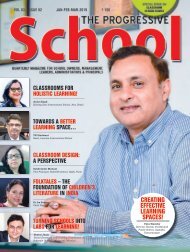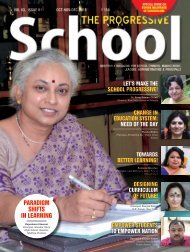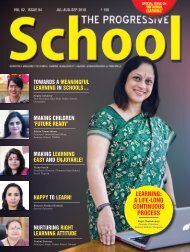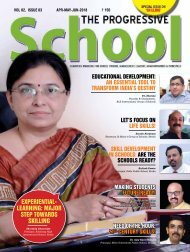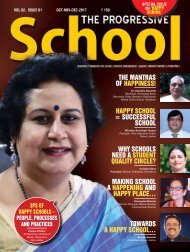The Progressive Teacher Vol 03 Issue 05
This issue of The Progressive Teacher focuses on "Teaching of Social Studies". The magazine provides guidance to the teachers by their peers and school leaders for tackling challenges with innovative ideas.
This issue of The Progressive Teacher focuses on "Teaching of Social Studies". The magazine provides guidance to the teachers by their peers and school leaders for tackling challenges with innovative ideas.
Create successful ePaper yourself
Turn your PDF publications into a flip-book with our unique Google optimized e-Paper software.
to research (e.g. history, art, religion,<br />
science, environment, etc) as per the<br />
requirement of the topic.<br />
• Ask students/ parents to explore the<br />
website of the location they will be<br />
visiting.<br />
• As a class brainstorm a set of standards<br />
of conduct for the trip (rules & penalty)<br />
and discuss money, meals and clothing to<br />
wear for the trip keeping the weather in<br />
mind.<br />
• Discuss with students how to ask good<br />
questions and brainstorm a list of openended<br />
questions to gather information<br />
during the visit. Record questions in<br />
student field trip journals.<br />
• Overview the field trip schedule.<br />
To Do List<br />
• Check all consent notes the day before the<br />
field trip.<br />
• Check Name tags/<br />
Gate Pass.<br />
• Divide students into<br />
small groups and<br />
assign leaders to<br />
groups.<br />
• Assign each student a partner.<br />
• Place a class list with mobile numbers in<br />
a folder.<br />
• Carry a cell phone as mentioned in the<br />
parent’s letter.<br />
• Take along an emergency kit (medicines<br />
for headache, vomiting, stomach ache,<br />
loose motions, glucose, and inhaler).<br />
• Take account of food, specific equipment,<br />
medicines pertinent to the particular field<br />
trip.<br />
• Number of students going/not going.<br />
During the Field Trip<br />
Plan activities that allow students to work<br />
alone, in pairs or small groups as per the<br />
schedule planned.<br />
Activities might include:<br />
• Keep an eye on the mile stones/ hoardings/<br />
sign boards and questions may be posed<br />
accordingly.<br />
• Provide clues and let children guess.<br />
• Students may be asked to prepare<br />
jingles, talk, write their observations,<br />
sketch, prepare questions based on their<br />
observations.<br />
• Field trip journals for recording answers<br />
to prepared questions based on clues.<br />
• Hand drawn postcards to write at the end<br />
of the tour that will summarize the field<br />
trip.<br />
• Provide time for students to observe, ask<br />
questions, and record key words, ideas and<br />
phrases as journal entries in their Field<br />
book after visiting.<br />
• Ask open ended questions – eg:<br />
1) How are these two exhibits/objects/<br />
monuments/animals/plants different from<br />
one another?<br />
2) What clues do these exhibits/objects/<br />
monuments/animals/plants provide?<br />
3) In what ways do these two objects relate<br />
to one another?<br />
4) If you could change one thing in this<br />
exhibit/object/ monument/animal/plant,<br />
what would it be?<br />
• Provide time for students to use<br />
Nov/Dec 2016<br />
camcorder, digital camera, etc for<br />
recording important resources viewed/<br />
heard. <strong>The</strong>n ask students to record<br />
one sentence in their Field trip journal<br />
describing why they felt the objective was<br />
of key importance.<br />
Post-Field Trip Activities<br />
Follow-up activities will aid student<br />
learning and multiply the value of hands-on<br />
experiences outside the classroom -<br />
• Provide time for students to share general<br />
observations and reactions to field trip<br />
experiences.<br />
• Share specific assignments students<br />
completed while on the field trip.<br />
• Create a classroom bulletin board<br />
displaying materials developed or<br />
collected while on the field trip.<br />
• Link field trip activities to multiple<br />
curricular areas. For example, students<br />
can develop vocabulary lists based on<br />
field trip observations; record field trip<br />
observations in a classroom journal;<br />
complete math problems related to actual<br />
field trip budget planning etc, Prepare<br />
posters to create more awareness in<br />
school about their learning.<br />
• Share and evaluate student assignments/<br />
activities from the Field Book.<br />
• Have the class compose and send thankyou<br />
letters to the field trip site host,<br />
teachers, parents, school administrators<br />
and other persons who supported the field<br />
trip. Include favourite objects or special<br />
information<br />
learned during<br />
the field trip.<br />
• Create a<br />
short news<br />
report about<br />
what happened on the field trip. Publicize<br />
the trip via an article in your local<br />
newspaper, school bulletin board, trip<br />
presentation for parents or class Web<br />
page/ website.<br />
Assessment: Students can pick activities<br />
as per their choice, give them the<br />
parameters of assessment and then assess<br />
accordingly.<br />
Or<br />
Prepare a MCQ/ VIVA/ PROJECT<br />
Evaluating the Trip (Did it help?)<br />
In the teacher’s diary make a note of the<br />
following questions as that will provide a<br />
good reference for future field trips.<br />
• Were the objectives met?<br />
• What went as per plan and what didn’t?<br />
• What was of unique educational value in<br />
this field trip?<br />
• Did the students meet the objectives/<br />
expectations?<br />
• Was there adequate time?<br />
• Was there adequate staff and adult<br />
supervision?<br />
• What should be added to make this a<br />
better experience in the future?<br />
• What should not be done at all?<br />
• Were the assessments helpful?<br />
• What improvements should be brought in<br />
to make the visit to this site better in the<br />
future?<br />
<strong>The</strong> same can be shared with the students,<br />
teachers and school administrators.<br />
news/event<br />
Twenty<br />
Students<br />
from Mumbai<br />
are Top in<br />
World in<br />
Cambridge<br />
International<br />
Examinations<br />
2016<br />
Mumbai, 17 October, 2016:<br />
Forty-one Indian students have<br />
achieved the highest marks and<br />
are Top in World in a range of individual<br />
subjects in the November 2015, March<br />
2016 and June 2016 examination series<br />
across Cambridge IGCSE, Cambridge<br />
International AS Level and Cambridge<br />
International A Level. 101 Indian<br />
students also achieved Top in Country<br />
across these qualifications.<br />
<strong>The</strong>se ‘toppers’ from schools across<br />
the country will be recognised for their<br />
outstanding academic achievements<br />
with an Outstanding Cambridge Learner<br />
certificate.<br />
Ruchira Ghosh, Regional Director<br />
South Asia, Cambridge International<br />
Examinations, said: ‘It gives us<br />
immense pleasure to see learners across<br />
India successfully exhibit their passion<br />
to succeed. <strong>The</strong>ir outstanding results<br />
in the Cambridge Examinations are a<br />
proof of the dedication and commitment<br />
of their teachers and the constant<br />
selfless support from their family and<br />
friends that helped them achieve this.<br />
We congratulate all these learners on<br />
their performance this year and wish<br />
them every success in all of their future<br />
endeavors.’<br />
<strong>The</strong>re has been a substantial and<br />
evident increase in the popularity of<br />
Cambridge qualifications in India and<br />
around the world. <strong>The</strong>re are over 370<br />
Cambridge schools in India. <strong>The</strong>re<br />
has been a 17 per cent increase in the<br />
number of entries for all qualifications<br />
in India since 2015, which includes<br />
the Cambridge IGCSE, Cambridge<br />
International AS Level and Cambridge<br />
International A Level. <strong>The</strong> most popular<br />
Cambridge IGCSE subjects in India are:<br />
First Language English, Mathematics,<br />
Hindi as a Second Language, Physics<br />
and Chemistry.<br />
www.progressiveteacher.in 61




